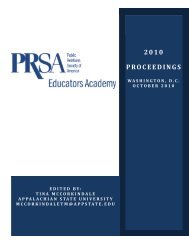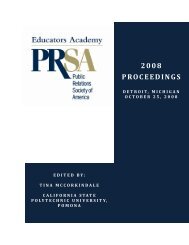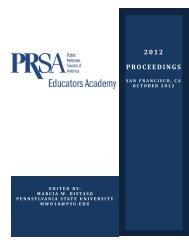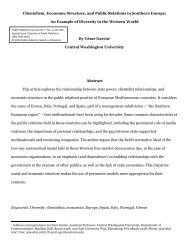2009 PROCEEDINGS - Public Relations Society of America
2009 PROCEEDINGS - Public Relations Society of America
2009 PROCEEDINGS - Public Relations Society of America
Create successful ePaper yourself
Turn your PDF publications into a flip-book with our unique Google optimized e-Paper software.
Using a Quasi-Experiment to Evaluate a PR Campaigns Class’s Efforts<br />
to Promote Energy Conservation in Eight Residence Halls<br />
Lynne M. Sallot, Ph.D., APR, Fellow PRSA<br />
University <strong>of</strong> Georgia<br />
sallot@uga.edu<br />
While most public relations educators agree that teaching research methods,<br />
measurement and evaluation are essential in the PR curriculum (O’Neil, 2005),<br />
particularly in the capstone campaigns course (Benigni, Cheng & Cameron, 2004),<br />
few—if any—have used quasi-experiments in PR Campaigns. This abstract reports<br />
the results <strong>of</strong> a campaigns class that used a quasi-experiment to assess its efforts to<br />
promote energy conservation to residents <strong>of</strong> eight dormitories at a large university in<br />
the southeastern U.S. The class implemented a competition with a full complement <strong>of</strong><br />
PR tactics in the two halls equipped with meters measuring residents’ daily energy<br />
consumption; some conservation PR strategies in four <strong>of</strong> the halls; and did no<br />
promotions <strong>of</strong> any kind in two other “control” halls. A pre-experiment survey <strong>of</strong><br />
residents’ self-reported conservation attitudes and behaviors revealed no significant<br />
differences among the eight halls. In the class’s post-experiment survey, there were<br />
several differences among residents in the eight halls. In the two halls receiving the<br />
full promotional treatments, residents were more likely to say energy conservation is<br />
important to them, they make an effort to conserve energy, and they rated their<br />
personal energy conservation habits higher than all but one <strong>of</strong> the other six residence<br />
halls. Also, analysis <strong>of</strong> records <strong>of</strong> daily energy consumption in the two “competition”<br />
halls revealed consumption dropped for up to 48 hours immediately following<br />
implementation <strong>of</strong> specific PR tactics. However, the post-survey revealed that<br />
residents in one <strong>of</strong> the “control” halls where the class had no public relations<br />
activities became as energy conservation conscious as residents in the two<br />
“competition” dormitories. The class investigated and learned that a resident majoring<br />
in ecology in that “control” dorm had launched her own one-woman campaign<br />
reminding her fellow residents in a variety <strong>of</strong> ways during the semester to conserve<br />
energy, proving to the class that just one person using public relations tactics can<br />
make a difference, such as effectively persuading residents <strong>of</strong> an entire dormitory to<br />
conserve energy!<br />
178

















